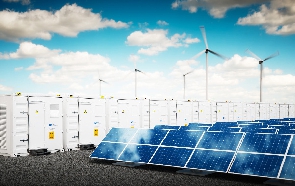Ghana, like many other countries around the globe, is currently facing significant energy price hikes caused by the ongoing war between Russia and Ukraine coupled with monetary policy issues. This conflict has led to the disruption of the global fossil market leading to an unprecedented hike in gas and crude oil prices, of which Ghana is no exception.
Petroleum products which are largely used in the transport and energy generation sectors in Ghana have had their prices more than doubled in the last year on the account of these disruptions.
According to Statista, the transport sector in Ghana consumes nearly 3.6 million tons of oil equivalent of petroleum products per annum, of which about 90% go into powering cars, buses, trucks and farm machinery. This phenomenon can steadily be reversed over the medium to long term with the adoption of electric vehicles and renewable energy sources as the energy crisis has exposed the vulnerabilities in our energy security and the ripple effect it has on other parts of the global and local economies(inflation).
The crisis has highlighted the importance of energy security and the need for countries to diversify their energy sources and reduce their dependence on a single source or particular energy types. Africa and for that matter, Ghana stands a better chance of easily moving away from fossils due to the advantage of abundance solar and wind energy prospects.
In this context, the strategic adoption of electric vehicles (EVs) and charging infrastructure in Ghana has become more important than it has ever been albeit the continuous expansion of fossil infrastructure across the country. Ironically, players in the petroleum industry in Ghana do not seem to understand the era we find ourselves in today.
Driving around the country, one could see the spring up of traditional fuel stations instead of charging stations as policymakers continue to play around with strict adoption of EVs. EVs are powered by electricity(in this case renewable energy), rather than fossil fuels, and can help to reduce dependence on oil imports and lower carbon emissions. Additionally, the development of charging infrastructure can support the growth of the EV market and help to improve access to reliable, sustainable energy.
One of the main benefits of EVs in Ghana is their potential to reduce dependence on oil imports. Ghana currently relies heavily on oil imports to meet its energy needs, which has become so costly and exposes the country to price volatility and supply disruptions. By shifting to EVs, Ghana can reduce its dependence on oil imports and mitigate the impact of global energy market fluctuations such as the one we are currently experiencing, caused by the Russia-Ukraine war.
Another key benefit of EVs in Ghana is their potential to lower carbon emissions as the world fights to reduce global warming. The transportation sector is a major source of greenhouse gas emissions and contributes to climate change.
By transitioning to EVs, Ghana can reduce its carbon footprint and help to meet its Nationally Determined Contribution under the Paris agreement. Additionally, the generation of electricity in Ghana needs to be tweaked substantially towards the renewables against the status quo which currently has 66% thermal and 33% hydro-solar.
To support the growth of the EV market in Ghana, a strong policy framework for the development of charging infrastructure is also crucial. Charging infrastructure can include everything from Level 1 chargers (120V) for home charging to Level 2 chargers (240V) for public charging and fast charging stations (DCFC) for long-distance travel. With adequate charging infrastructure in place, EV owners can have peace of mind when it comes to range anxiety, and this can help to increase the adoption of EVs in Ghana.
Furthermore, the development of charging infrastructure can help to improve access to reliable, sustainable energy. With the integration of renewable energy sources, such as solar and wind power, into the charging infrastructure, Ghana can increase its use of clean energy and reduce its dependence on fossil fuels.
Similarly, charging infrastructure can also help to improve grid stability by providing a way to store and balance excess renewable energy which has become a conundrum over the past years due to take or pay agreements Ghana has signed.
In conclusion, the strategic adoption of EVs and charging infrastructure in Ghana is becoming increasingly important in the context of the ongoing energy crisis caused by the Russia-Ukraine war. EVs can help to reduce dependence on oil imports and lower carbon emissions, while the development of charging infrastructure can support the growth of the EV market and improve access to reliable, sustainable energy.
The government of Ghana should consider policy and regulatory measures that encourage the adoption of EVs and charging infrastructure, as well as investments in research and development to support the growth of this market.
Additionally, collaboration with the private sector and international organizations can also be vital in achieving these objectives. With the right approach, Ghana can take advantage of the opportunities presented by the transition to EVs and charging infrastructure and improve its energy security and sustainability in the long term.
Opinions of Monday, 23 January 2023
Columnist: Baba Issaka















